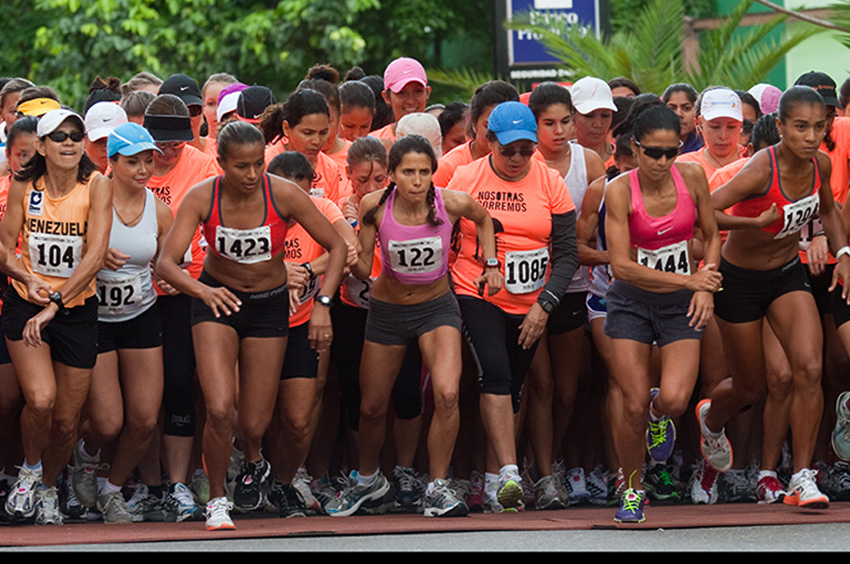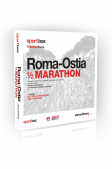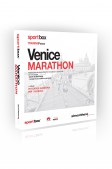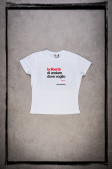A quick search on Google shows us that there are ever-increasing numbers of women-only races. But is this a good thing?
Running USA reports that in 2012 women accounted for a massive 56% of total road race finishers, the highest percentage recorded to date (USA data only). In 1990 this figure was only 25%. The 2012 percentages vary slightly over each distance, with women dominating the shorter races from 5k up to the half marathon, whilst at the marathon distance the percentage of women as a percentage of total finishers drops to 40%.
This looks like great news to me, women have achieved not only equality but in some cases dominance in road racing! Sadly I fear these results would not be replicated if the research was carried out in many other countries. I often race in Italy where the percentage of women participating in races is still pretty low – and this despite the efforts of many great coaches and mentors doing a great job in promoting the benefits of running to women. To get an idea of how the male/female finisher ratio varies, here are the data for 2012 marathon finishers published by ARRS (Association of Road Racing Statisticians).

However, I don’t like women-only races.
Don’t get me wrong, I really believe that women should be encouraged to take part in sport and anyone or anything that gives women (or men!) a reason to try a new sport has my support.
I’m just a little worried that with the ever-increasing number of “women-only” races, we’re sending out the wrong message (i.e. that women need “special” races) and we’re losing out on one of the great positives of running – that is, the fact that regardless of gender, of age, of pace, of background, we’re all in it together. We all run the same course on the same day at the same time, the elite athletes followed by the mass runners (in which other sport can that happen?).
There is a very real running community, both out on the roads and online. Hundreds of thousands of people who have lived the ups-and-downs of our chosen sport, who have experienced everything from the pride of completing their first lap around the local park to the most challenging ultra-marathon.
Perhaps I have just been very lucky, but I have always found (with very few limited exceptions) that runners are a welcoming bunch, happy to welcome beginners, to help out with tips, advice and moral support and to share a genuine love of the sport. Just take a look at how many runners help each other get round the last few miles of a marathon, or watch the top finishers in a local race compete all the way to the tape, then congratulate each other and go and share a beer.
Every runner has had great days when they feel ready to take on the world and days when they’ve suffered every step. We’ve all ached, felt tired and asked ourselves what we are doing running for miles early on a Sunday morning with a group of strangers whilst friends and family are chilling out at home. But we’ve all also felt the joy of crossing the finish line and the pride of meeting or beating our (personal) objective. It is this shared experience that creates a bond that is difficult to replicate in other areas of life.
I’ve been talking about “runners” and for some people this might bring to mind the super-fit, toned 20 year-old athletes you see on the advertising billboards. But one of the great things about running is that there is no barrier to entry – all you need to do to be a runner is to lace up your shoes and start putting one foot in front of the other.
In creating women-only events, we’re losing the benefit and experience of the full running community as to a certain extent, we’re saying that women need different treatment, that they need “special” races because they can’t compete in the “men’s races.”
It is true that at an elite level, men are faster than women. But from Paula Radcliffe’s 02:15 marathon down there are a lot of women who are quick. Very quick. Much quicker than a lot of men. So for mass participation races that excuse just doesn’t do it. And again, it goes against the whole spirit of the (mass) sport – anyone and everyone is welcome.
I also appreciate that that it may be very daunting for beginners to take those first steps, to give running a try, to do something they’ve never done before, and get over the fear of looking stupid and out of place (I had to go through the process myself!). This is made even more difficult if you don’t have the support of (or worse you are discouraged by) friends and family. However, one of the greatest benefits of running has nothing to do with physical fitness. It is about determination, courage, the ability to challenge yourself, to push yourself to your (personal) limit, and to overcome obstacles and see what you can achieve if you really want to.
Women only events might feel less intimidating for beginners (although I’m not convinced, women can be just as judgemental as men, it’s a question of character not gender) but I say to all women join a club or sign up for a mixed event – it might be daunting at first, but you’ll feel just great once you’ve done it.
And once you get there you’ll realise that everyone looks pretty stupid but they feel fantastic.
Oh, and I can’t deny, beating the guys to the finish line makes all the training worthwhile.



 Subscribe to our newsletter to have the latest updates delivered straight to your inbox.
Subscribe to our newsletter to have the latest updates delivered straight to your inbox. TRI60 DISTANCE TRAINING
TRI60 DISTANCE TRAINING  Sportbox Training Focus Roma-Ostia Half Marathon 2019
Sportbox Training Focus Roma-Ostia Half Marathon 2019  Sportbox Training Focus Venice Marathon 2019
Sportbox Training Focus Venice Marathon 2019  t-shirt limited edition autographed by Danilo Goffi
t-shirt limited edition autographed by Danilo Goffi  Women's Sitting technical t-shirt
Women's Sitting technical t-shirt  Women's dove voglio technical t-shirt
Women's dove voglio technical t-shirt 
I am all for women-only races…..so long as those women do not scream like a banshee when we start male-only races.